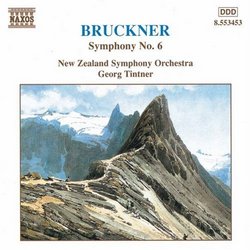| All Artists: Anton Bruckner, Georg Tintner, New Zealand Symphony Orchestra Title: Bruckner: Symphony No. 6 in A major - Georg Tintner Members Wishing: 0 Total Copies: 0 Label: Naxos Release Date: 1/1/1998 Genre: Classical Style: Symphonies Number of Discs: 1 SwapaCD Credits: 1 UPC: 730099445320 |
Search - Anton Bruckner, Georg Tintner, New Zealand Symphony Orchestra :: Bruckner: Symphony No. 6 in A major - Georg Tintner
 | Anton Bruckner, Georg Tintner, New Zealand Symphony Orchestra Bruckner: Symphony No. 6 in A major - Georg Tintner Genre: Classical
|
Larger Image |
CD Details |
CD ReviewsI've heard them all Howard G Brown | Port St. Lucie, FL USA | 07/06/2001 (5 out of 5 stars) "In my 56 years I have heard about every recording of this symphony that his been available in the US, starting with the Swoboda-conducted lp on Westminster back in the 50s. Keilberth/Berlin, Stein/VPO, Klemperer/Amsterdam and New Philharmonia have been the highlights for me. I rate this recording among them. I find it rhythmically alert in the 1st movement, and for once the finale has purpose and direction as well as drive and energy. I also think the coda of the first movt. -- one of Bruckner's most remarkable -- is perhaps the finest here of any recording I now own or can remember.Perhaps I just find myself in tune with Tinter's approach. I now own the complete set, and value it as highly as Jochum's EMI set, and not only for offering alternate ecitions of the scores. That, I believe, says it all." Experience it. ScopeGuru | Chicago | 01/23/2000 (5 out of 5 stars) "This is a surprisingly good performance of the 6th symphony by the NZSO, and a testament to the great artistry of Georg Tintner. Bruckner on many occasions modified the scores of his symphonies, often against his will. The Sixth is one of the luckiest in the sense that it has never undergone any wholesale alteration by Bruckner. It is, however, also one of the unluckiest of all Bruckner's symphonies for it frequently receives astonishingly poor interpretations. The first movement starts with a simple yet difficult marking - `Majestoso'. Bruckner went through an untiring effort to make sure that despite the palpable energy that permeates the entire movement, the music should be majestic in nature. Unfortunately, the cautiously skeletal markings are often blatantly ignored by many conductors who add numerous flashy and unnecessary tricks in their performances, leading ultimately to this movement sounding more Beethovenian than Brucknerian. Under the stoic and sensitive guidance of Tintner, the austere majesty of the work emerges with humbling beauty. The tempi are naturally paced, and the NZSO responds with an unerring accuracy that puts many world-class orchestral powerhouses to shame. The second movement of the symphony is perhaps one of the most heart-wrenching human utterances ever written. The poignant beauty of the movement makes it especially vulnerable to over-dramatization, as exemplified by the otherwise extremely fine Celibidache's rendition on EMI. The movement begins and ends with a heartrending oboe solo. It brings an untold story from the distance, and it takes with it the present despair to the distance. The success of performing this movement (hence the whole symphony) lies in the ability of the musicians to convey this recurrence, and to reveal the inexplicable destiny of the music - the end at the beginning, and the beginning at the end. Tintner captures this cyclical continuum with a sense of purpose that not only justifies the existence of the slow middle section, but also allows it to unfold with compelling necessity. The last two movements are perhaps some of the most problematic musical cases faced by musicians, they are organic yet conflicting. Tintner resolves them with great convictions and insights that ultimately allow the music to shine through with mesmerizing and incandescent excitement.Tintner's mastery lies in his deep understanding and love for this symphony, which are apparent through his sensitive and purposeful reading. Not a single phrase in the symphony is over-conducted. It is one of the most magical moments when the music collapses into the ethereal morendo at the end of the second movement. We find ourselves suddenly connected with the colossal cosmos of Bruckner's imagination. This is the ultimate success for a musician, when the interpreter ceases to exist between the composer and the listener. This bargain CD epitomizes the purpose of music. Experience it, for no superlative can do justice to Tintner, and more importantly, to Bruckner." A majestic vision, an inferior orchestra Gregory M. Zinkl | Chicago, IL | 06/06/2000 (4 out of 5 stars) "Tintner's vision of the Bruckner 6th is wonderful. His pacing is perfect, his control of climaxes is impressive, and he understands the complex architecture of this wonderful work.Having said that, the New Zealand Symphony, while possessing a lovely string tone and good wind and brass, really can't give Tintner everything he asks for. Disturbingly, the strings, especially the violins, have frequent mishaps that often seem to mar the phrasing, especially at the end of long phrases. In light of this, unless you are understandably a huge Tintner fan, the sixth to get on a budget label is Skrowaczewski with the wonderful Saarbrucken forces on Arte Nova. Both conductors have similar takes on the music, but Skrowaczewski has the better orchestra, and sometimes he holds the tension a little better, too.The engineering is admirable."
|

 Track Listings (4) - Disc #1
Track Listings (4) - Disc #1